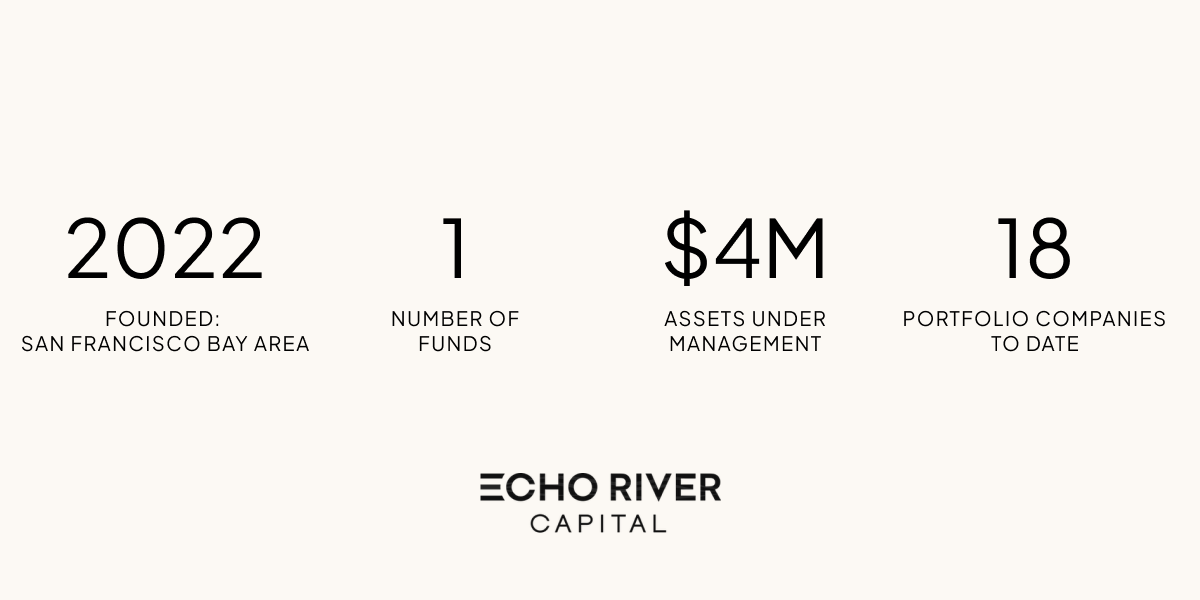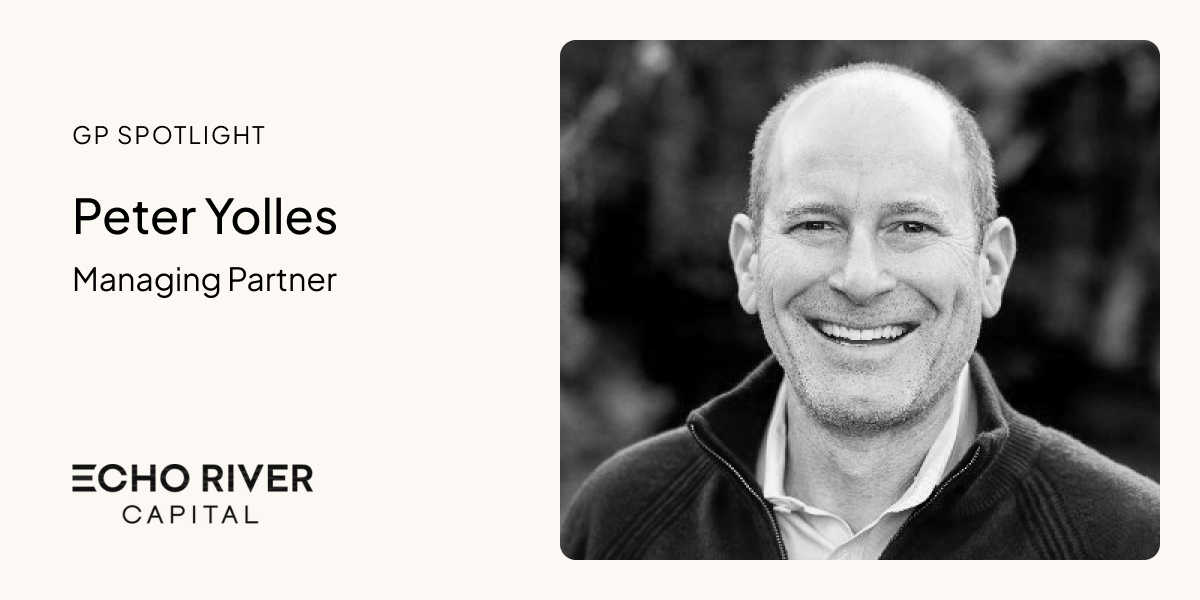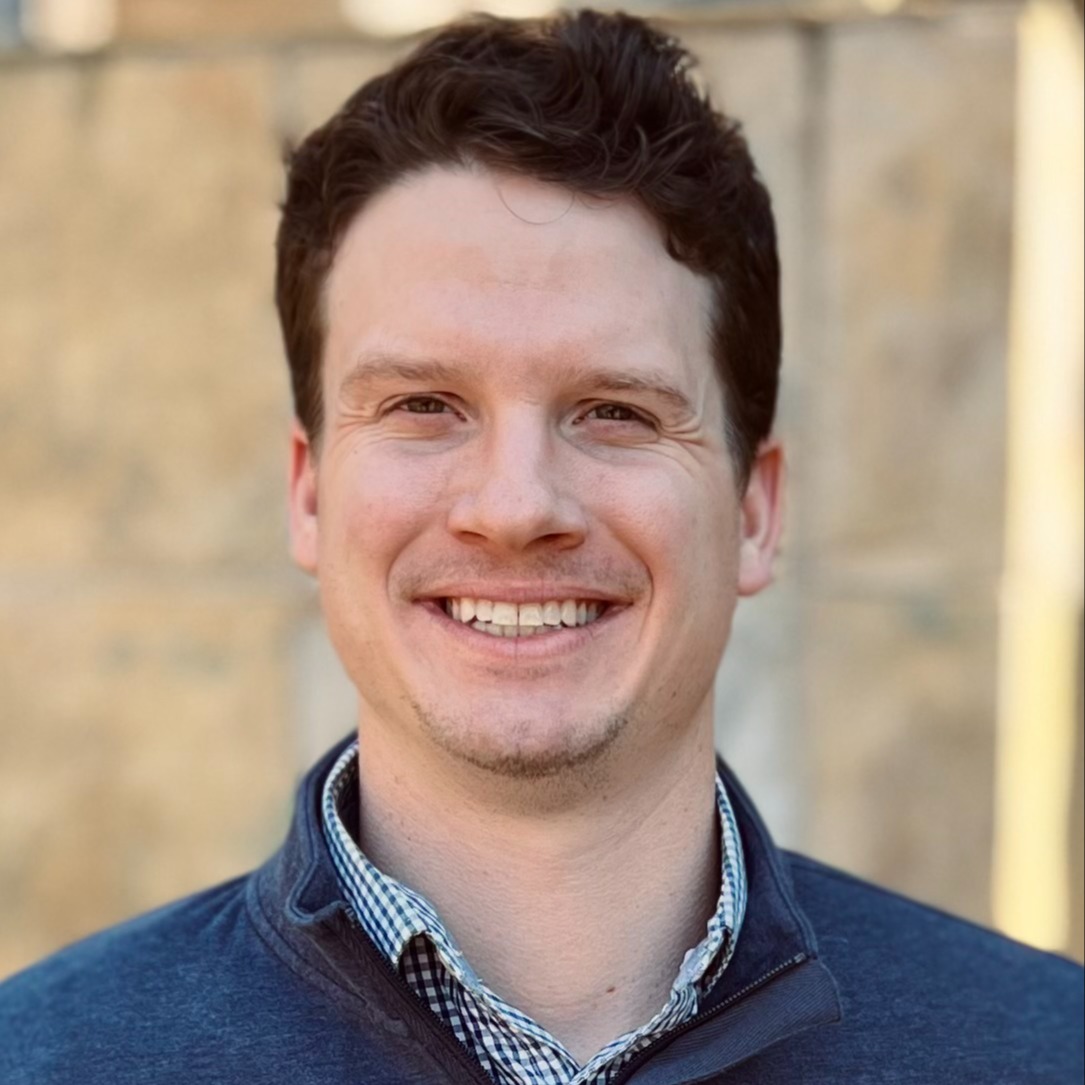When Echo River Capital managing partner Peter Yolles sold his watertech company WaterSmart Software to VertexOne in 2020, he knew almost immediately it was time for a bigger challenge and to make a more lasting impact. After a career spent working on creating sustainable water solutions, Yolles raised money from individuals and family office LPs to launch his own investment firm focused on backing watertech startups.
In a discussion with Carta, Yolles revealed more about his reason for launching Echo River Capital, which invests in the Three “Ds” of watertech: Digitization, Decarbonization, and Decentralization. Yolles also discussed plans to launch his own ESG measurement apparatus, a tool he believes will provide a guide and template for emerging impact investors.

Adam: Does Echo River have a target investment size?
Peter: It’s a great question. Fund I had a final close on about $4 million in April 2023. So I’m investing approximately $50,000 initially into 30 to 35 companies with about half of the investable capital for follow-on deals into the winners.
Adam: What is your estimated holding time for these investments?
Peter: Echo River is a 10-year fund with two one-year options. Hopefully some companies will be fast growers so that some capital can be recycled into more investments. A key element for rapid growth is finding companies with validated technology so that we don’t have to spend time waiting for the technology to develop. These companies may have spent three to five years honing their technology and securing IP using non-dilutive capital. So the optimal target I’m looking for, as an inflection point, is a company with validated technology, that is pre-commercial, and that might have two or three pilot projects as proof-points.
Adam: Is there a specific type of LP you’ve tried to bring in? Has it been mostly individuals or institution-based?
Peter: Our current investors are individuals and family offices who recognize that climate change represents the largest investment opportunity of our time, and who understand that applying a water lens to climate solutions tackles monumental challenges around water scarcity, water pollution, greenhouse gas emissions, and sea-level rise.
Adam: You’re in the ESG space, and you’re trying to invest for the greater good. How do you weigh social gains or impact against a possible return on an investment?
Peter: Echo River is targeting both market-rate returns, and measurable, quantified impact. As a pre-seed and seed-stage fund, the financial target is a market rate 3x net return for the LPs. And we’re quantifying the impact across improvements in the environment, human health, and climate resilience. Echo River is developing cumulative fund-wide targets around how many billions of gallons of water can be saved, how much water pollution can be removed, and how many gigatons of greenhouse gas emissions can be avoided. There are also improvements to human quality of life and to sustaining ecosystems to acknowledge.
To operationalize this, Echo River provides an impact side letter template for each portfolio company to complete. It identifies up to three quantifiable impact metrics, one qualifiable impact metric, and an opportunity to share DEIB information (diversity, equity, inclusion and belonging). Data and metadata will be collected from each company annually. The data will be shared with LPs and, with company permission, to the public. Cumulative fund-level impact targets are being assembled now and will address clean water, water scarcity, and avoided greenhouse gas emissions associated with water management.
In addition, we’re developing an innovative fund-level toolkit, so that any early-stage fund can incorporate impact strategy. What we found was that the tools that were available to measure impact were geared for later-stage funds. We’re developing and implementing that toolkit now, and we will make it available to the community and other emerging managers and early-stage funds so that they can use it to measure and report on impact in their own funds.
Adam:There’s a lot of talk from ESG investors about the lack of a uniform measurement system.
Peter: The key for us is backing it up with data, and also transforming where I think most funds are today, which is measuring output but not taking the next step to connecting that with outcomes and impact benchmarks. An example of an output could be a gallon of water saved by implementing a new technology. It’s also important to ask the next question: What is the impact on the environment from saving that water? Is there an improvement in the quality of the river or a reduction in water stress in that river basin? Or is there improvement in the groundwater table? Or is there a reduction in pollution that might affect and improve human health? And then, it’s important to connect outcomes to impact benchmarks. Do those outcomes align with regional or global metrics, like a Sustainable Development Goal? As a watertech fund, Echo River is aligned with Sustainable Development Goal number six, which is around improving clean water and sanitation.
Adam: With the water crises we’re having, it seems like we’re not where we should be in terms of getting clean water to people in the U.S. Is that part of your assessment, as well?
Peter:There are over two billion people globally who do not have clean, reliable access to water and sanitation, including about 10 million people here in the United States. It’s shameful that 50 countries and the UN have declared clean water and sanitation as a fundamental human right yet we still do not invest sufficiently to meet that goal.
So yes, Echo River does invest into technologies and innovations that can improve deliveries of clean, reliable water to people in their homes or businesses, improve water productivity, and can support the ecosystems that underpin human civilization.
That can include improving the productivity of existing centralized water systems, like utilities companies using AI to find and predict leaks. And that includes alternative water supplies—like technologies that can leapfrog centralized systems to become decentralized. That might look like onsite recycling and reusing water at a particular location, like in a large urban building. Or that might look like capturing water from the air to provide clean water for drying up rivers, lakes, and groundwater.
Adam:One other thing I loved on your website is you have a form fill for startups to pitch you, which I don’t see very often. I was curious if you discovered any investment opportunities from people filling out the form.
Peter: We actually do have founders completing the funding application form at the Echo River Capital website, and I follow up with them personally. Some companies come in over the transom through other investors or contact me directly because of my reputation in the water industry. And it does help when founders have sought out Echo River Capital as a preferred funder and strategic partner.
Adam:Do you think your biggest differentiator as an investor is being a founder—not only in terms of being founder friendly, but also having the breadth of experience in this specific space?
Peter: Definitely founders in the water technology space see Echo River Capital as a strategic partner because of the deep domain expertise and the global network that I can tap to accelerate their business. And they appreciate that I offer advice as a fellow founder and CEO of WaterSmart Software, which was acquired in 2020. So those things combined really make Echo River an attractive partner to have on their cap table from their first round onwards.

